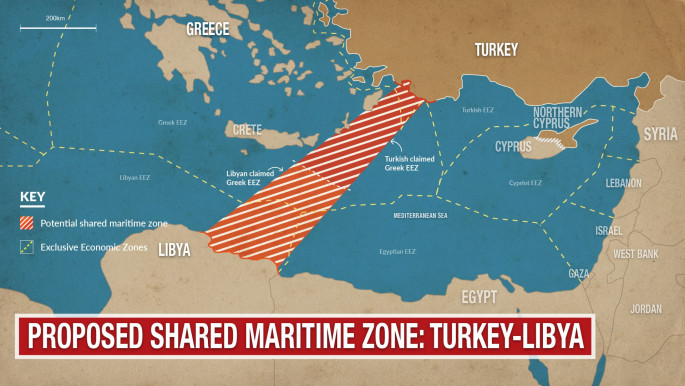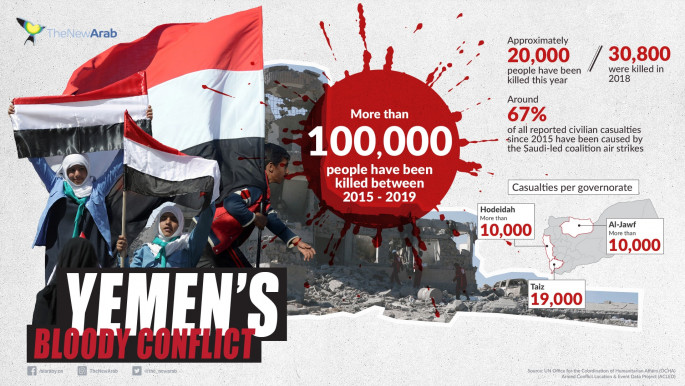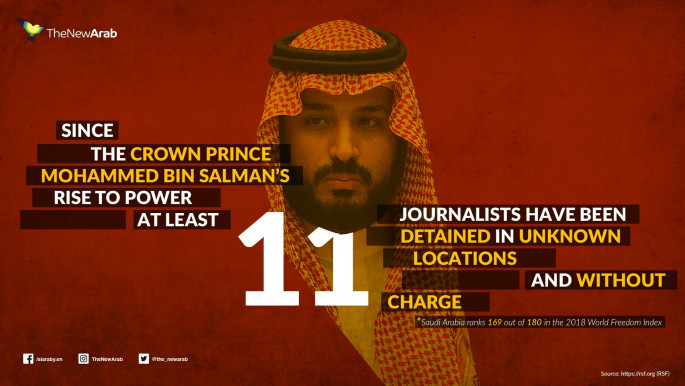Top ten things to look out for in the year ahead
2019 was a year of immense tension, upheaval and change. The world sat at the edge of its seat as protesters took to the streets of countries in the Middle East, and around the world, calling for greater freedoms, climate justice and an end to oppression.
Will this continue into 2020 and beyond? How will the tides of freedom and tyranny continue to push and pull across the region?
Here's The New Arab's look at the elections, trials and protests scheduled for the year ahead and the possible changes that could come out of 2020.
1. Anti-government protests
Perhaps inspired by successful protests in Sudan and Algeria, protests kicked off in 2019 across many other parts of the Middle East, including Iran, Lebanon and Iraq.
And they've shown no signs of abating. In Algeria, mass protests against the new government have continued long after the resignation of long-time president Abdelaziz Bouteflika in April.
Despite the election of Abdelmadjid Tebboune as president, army chief Ahmed Gaid Salah was widely seen as the country's real power broker. Observers should keep a keen eye on Algiers in the coming weeks and months after his sudden death this month.
In Iraq, demonstrators have rallied for almost three months to demand the ouster of the entire political class. In Lebanon, an anti-government street movement has rocked the small Mediterranean country since October 17.
Demonstrations are almost certainly set to continue in both countries after the expected appointments of new prime ministers.
|
There is nothing to suggest that the desire for political change will weaken among those calling for change and these countries will have to forge a way through the political deadlock in the next year.
2. Trump vs. the Democrats
The election of Donald Trump to the position of US president drastically altered the landscape of global politics over the past four years. Next year's election, to be held on November 3, will hold equal significance.
We will know the Democratic Party's presidential election candidate in July, after which campaigning will begin in full force.
President Trump's pro-Israel policies, which critics say have emboldened Israeli settlement expansion and rights abuses, will continue if he secures another term - marking a further blow to the possibility of a Palestinian state.
In the meantime, Trump will have to ward off challenges at home. The president will stand in an impeachment trial in the US senate, due to start right at the beginning of the new year.
3. Israel goes to the polls, again
Israel's worst political crisis in decades will continue in the coming year. Israeli parliament dissolved in December and called elections for March 2, less than three months after an inconclusive general election saw neither Prime Minister Benjamin Netanyahu nor rival Benny Gantz able to form a governing coalition.
Read more: ICC probe into alleged Israeli war crimes 'blatant anti-Semitism', says Netanyahu
The September election followed a similarly deadlocked vote in April, making next year's March vote Israel's third election in a year and a half. Opinion polls suggest the third round could again be tight, with neither Netanyahu's right-wing bloc nor Gantz's centre-left alliance currently on course for a majority.
For Netanyahu, who was last month indicted on a series of corruption charges, the immediate challenge is to make sure he leads his Likud party into the election - with a leadership primary set for this month.
4. Another year of summits
2020 will see world leaders come together on multiple occasions as they attempt to compromise on pressing issues.
The COP26 UN Climate Change Conference is scheduled for November in Glasgow and will be closely watched by climate activists. December's 12-day COP25 talks extended two days into overtime but still punted the carbon market conundrum to next year's COP26.
The G20 presidency, which Saudi Arabia took over from Japan, will see it host world leaders for a global summit in its capital on November 21-22. The case of journalist Jamal Khashoggi's brutal murder is likely to remain a headache for Saudi Arabia as it gears up for the G20 summit.
Read more: Saudi Arabia becomes first Arab nation to head G20 despite human rights concerns
In June, the United States will host G7 leaders at Camp David in Maryland. President Trump had wanted to host next year's June 10 to 12 gathering at the Trump National Doral resort outside Miami, but he backed down in October after he was accused of seeking profit from US diplomacy.
5. Turkey's growing role in Libya
The past month has seen Turkey become increasingly embroiled in Libya's conflict, as it seeks to bolster the internationally recognised Government of National Accord (GNA) against an offensive by rogue military general Khalifa Haftar and his forces.
Ankara signed both a maritime and military cooperation with the Tripoli government last month, both of which have since been approved by Turkey's parliament. The deal expands Turkey's claims over a large gas-rich area of the Mediterranean Sea and has been denounced by Greece, Egypt and Cyprus.
 |
| Read more: Turkish-Libyan alliance in eastern Mediterranean: A game changer? |
Turkish President Recep Tayyip Erdogan has also vowed to increase military support to Libya if necessary, opening the door for committed military involvement in the new year.
General Haftar is backed by Saudi Arabia, Egypt and the United Arab Emirates and what plays out in Libya could have ripple effects across the Mediterrean and Arabic-speaking world.
6. Iranians head to the polls
Preparations are already underway for Iran's general election set to be held on February 21. Almost 16,000 people have registered to compete for the 290 parliamentary seats, according to Al Jazeera.
The Iranian government brutally suppressed anti-government protests in November, giving reason to suggest they will keep a close eye on the election proceedings.
7. An end in sight for Yemen's civil war?
 |
The 26th of March next year will mark the fifth anniversary of the Saudi-led military intervention in Yemen to support the government against Iran-aligned Houthi rebels.
Efforts to end the five-year war in Yemen appear to have gained momentum in recent months, with rebels largely halting attacks against Saudi Arabia, and Riyadh talking about an "open channel" of communication with the Houthis.
Read more: Yemen in Focus: Sudan troops exit deadly war after five-year stalemate
In an ominous sign though, the government and southern separatists have failed to meet a deadline to establish a power-sharing cabinet under a deal to end a crisis on another front - the fight for the southern city of Aden, which was snatched by the southern secessionists in August.
Many hope that by the wars' five-year anniversary, steps will have been taken to end the quagmire that has also triggered a humanitarian catastrophe in the Arab world's poorest country.
|
8. Sanctions or silence? The case of the Uighurs
One of the most striking issues to gain media attention in 2019 was the case of the Uighur minority. As the news broke, China faced international condemnation for rounding up an estimated one million Uighurs and other mostly Muslim ethnic minorities in internment camps in the northwestern region of Xinjiang.
With both the European Parliament and the United States considering sanctions over the issue, 2020 could see China cut off for its human rights abuses.
But few Muslim countries have openly criticised China given its huge economic clout and there's a highly possibility 2020 will be another year of global silence on the issue.
9. Possible rapprochement in the Gulf
Towards the end of 2019, Riyadh appeared to be adopting a de-escalatory approach to the Gulf Crisis, which began in June 2017 when Saudi Arabia, along with its allies the United Arab Emirates, Bahrain and Egypt cut all diplomatic and transport ties with Qatar.
In a sign of the changing mood, the Doha delegation led by Qatar's prime minister received a warm welcome at a Gulf summit in Riyadh.
Read more: Did this year's GCC summit help bridge Gulf differences?
Recent "sports diplomacy", which saw football teams from Saudi Arabia, the UAE and Bahrain travel to Qatar for the Gulf Cup, has also raised hopes of a thaw.
Analysts say the nascent rapprochement appears to be shaping up without major concessions from Doha, after the blockade boosted its self-reliance.
10. 2020's notable trials
The day last year when 51 Muslim worshippers were brutally gunned down in Christchurch shocked New Zealand as well as the world. The trial for the Australian man accused of the mosque massacre will begin on May 3.
 |
In Saudi Arabia, the trials of Saudi dissidents will continue. Among them are a dozen women activists, most of whom were detained in a wide-ranging crackdown just before the historic lifting of a decades-long ban on female motorists in 2018. A verdict in the trial of prominent Saudi cleric Salman al-Awdah is also still expected.
Read more: Saudi Arabia launches new crackdown on suspected critics
Turkey's trial of pro-Kurdish leader Selahattin Demirtas resumes in January. A hearing in the trial of Amnesty International's Turkey director will also be held February 19.
Looking ahead
Next year's ups and downs will go far beyond this top ten list. The ongoing conflict in Syria is certain to dominate news headlines, as Russian and regime airstrikes continue to wreak havoc in rebel-held regions.
Oman could also see itself with a new ruler in 2020 as Sultan Qaboos bin Said's health continues to worsen. According to The Guardian, discussions are already under way to appoint his successor.
Read more: Closing the decade: 10 events that drastically changed the Middle East
Sudan is another one to keep an eye on. Beyond ousting its former ruler, Sudan's protest movement also extracted an agreement from military leaders in August that guarantees a transition to civilian rule. 2020 will see Sudan grapple with implementing the demands of those who took to the streets.
Agencies contributed to this report.
Follow us on Twitter and Instagram to stay connected





 Follow the Middle East's top stories in English at The New Arab on Google News
Follow the Middle East's top stories in English at The New Arab on Google News
![Israeli forces ordered bombed Gaza's Jabalia, ordering residents to leave [Getty]](/sites/default/files/styles/image_330x185/public/2176418030.jpeg?h=a5f2f23a&itok=_YGZaP1z)

